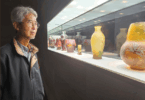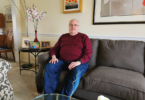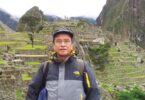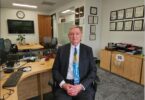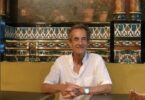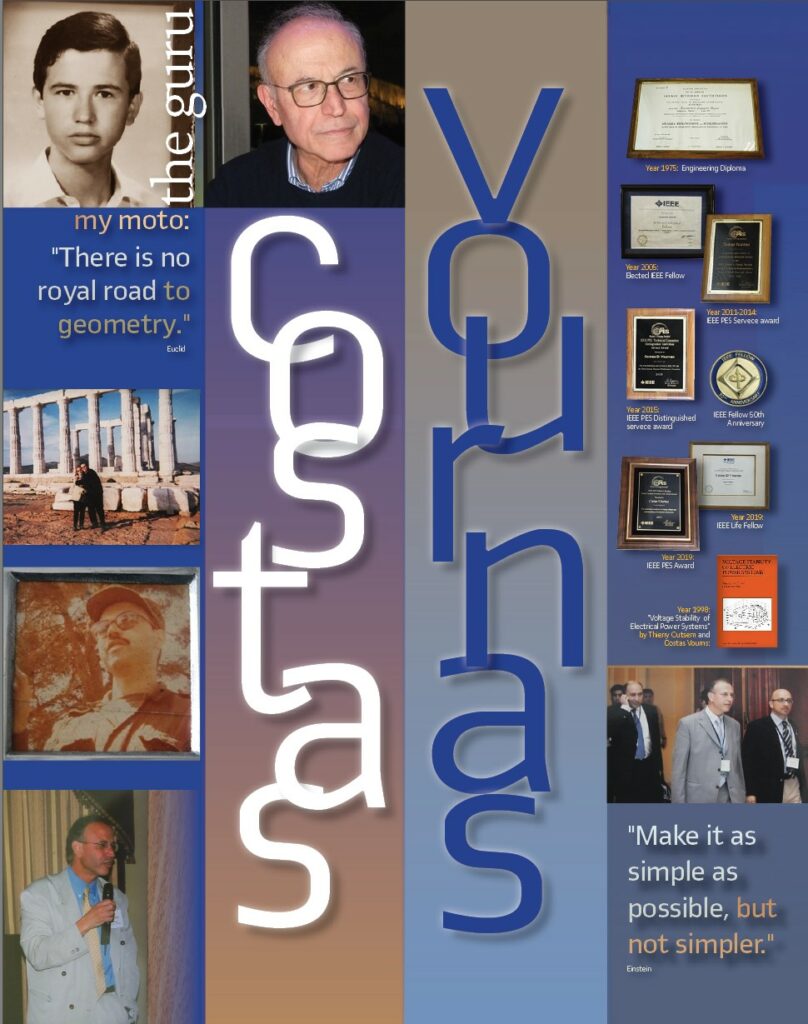
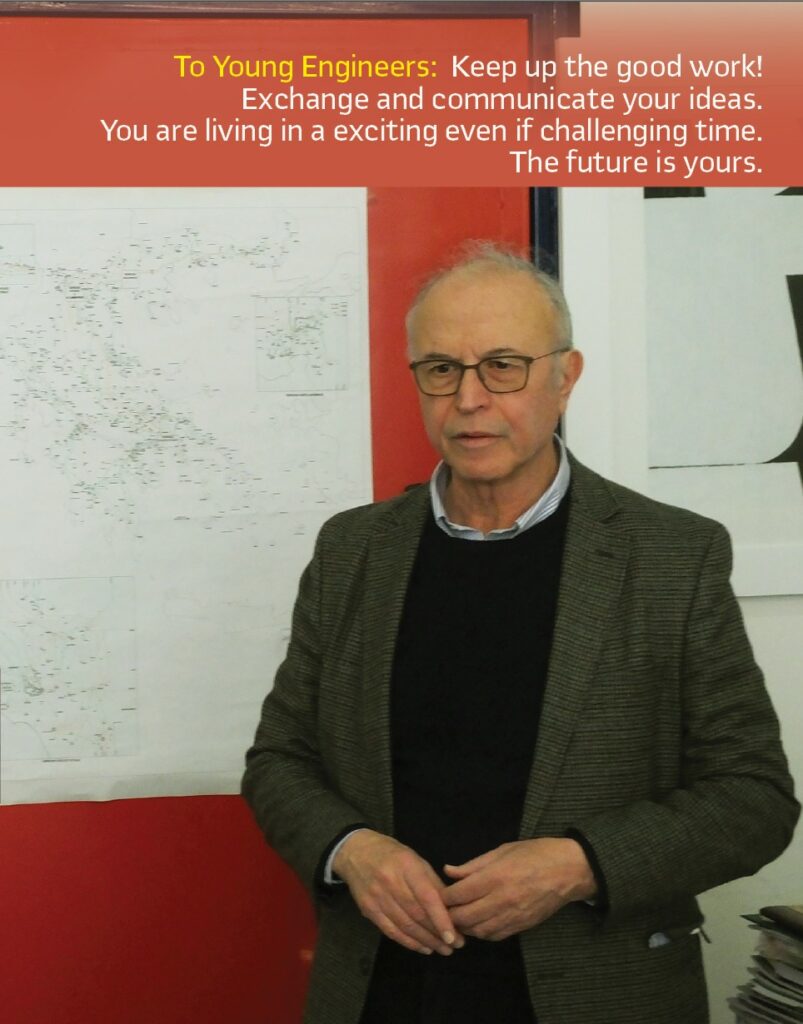
PAC World: When and where were you born?
C.V.: I was born in the city of Patra in Western Greece (200 km from Athens). I have few memories from Patra as a baby, but I have visited the city many times when I grew up and I like it a lot. The city is proud of hosting the best Carnival in Greece and as it turns out, I was born exactly on the Sunday of the big Carnival parade.
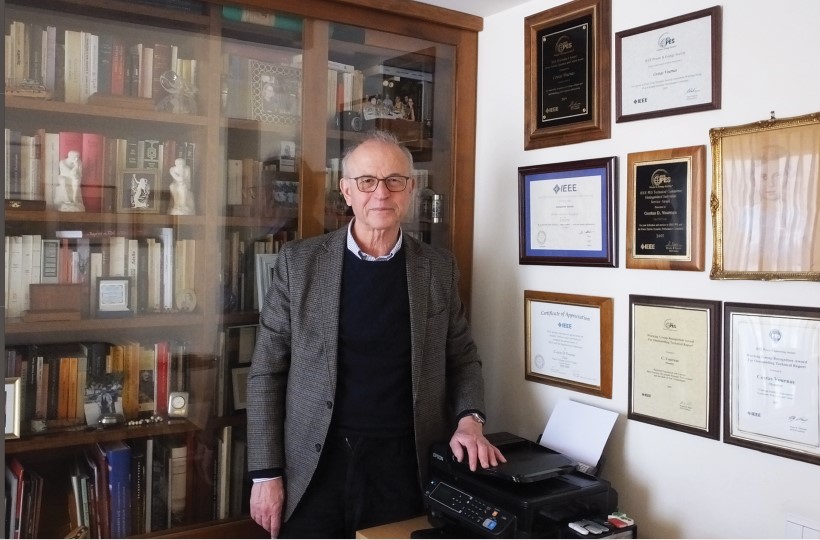
PAC World: Where did you grow up and where did you go to school?
C.V.: My father was a public prosecutor serving in Patra at the time of my birth and until I was 3. We then moved as a family to Athens where I grew up and went to school. My parents chose for me the Experimental School of the University of Athens, where I studied for 12 years, and they made a great choice.
PAC World: Did you have any specific interests while in school?
C.V: At school I was considered an expert in Math, but I equally enjoyed classical subjects. My School followed the so-called “classical” program – we were taught a lot of Ancient Greek, even Latin. When I was in the first grade of Secondary School there was a major educational reform, and we were the first to be taught Set Theory as an introduction to Secondary School Math. We also had algebra from the first class when the older students were not taught equations till the third class. There was a funny incident when our math teacher took me one day when I was in the First class to his lesson in the Third class, where he asked me to solve a problem that the older students could not handle, which made them mad at me, but a hero in my own class. This contributed a lot to my early fame as a math celebrity…
PAC World: Can you think of someone or something in your childhood that influenced your decision to become an engineer?
C.V.: My mother’s family was coming from the city of Aegion not far from Patra, and many of her relatives were engineers. My elder brother is also a Civil Engineer, so this together with my mathematical skills, made engineering a natural choice. My father, of course, having Law background and being a Law professional was another influence. However, he had realized that a Law career was, at that time at least (we were in the 1960s), much more challenging and much less profitable than a career in Engineering, so he did not try to influence any of his sons. He often joked with his colleagues that they were setting an example “not to be followed” referring to overwork and underpayment. Shortly after, the salaries of judges and prosecutors were doubled, which helped our family’s financial state, but this was not enough to change my course, which was already decided.
PAC World: Where did you go to university and why did you choose it?
C.V.: In Greece, all University Departments have a fixed number (numerus clauses) of accepted students per year, who are selected through a national exam, taken by high school graduates each year. In this national exam I achieved a very good score, so I was able to join the School of Mechanical and Electrical Engineering of the National Technical University of Athens (NTUA), which was my first choice. NTUA is the first technical university in Greece and at that time was the only one offering a program in electrical and mechanical engineering, so it was naturally my first choice.
PAC World: Why did you decide to study electrical engineering?
C.V.: As I said before, when I entered University the program of studies was for both mechanical and electrical engineering. I chose the program because I preferred the physics-related applications (mechanics, electricity, etc.) to the buildings-construction oriented civil engineering and had no particular interest in chemistry. After our first year, the School of Mechanical and Electrical Engineering decided to split in two different schools and programs, and we had to make a choice between the two. Judging from my first-year experiences, I was more inclined to follow the electrical path, as the detailed mechanical design and machine shop laboratory were not very appealing to me. However, I later appreciated quite a lot also the mechanical side of our profession and to this day I continue to teach electrical engineers a Power Generation course which includes thermodynamics, steam, gas, and hydro turbines… In the Electrical Engineering program of studies, I had later to do another choice between electronics and energy systems, and I chose the latter coming closer to my initial choice that combined electricity and mechanics.
PAC World: Why did you decide to continue your education in Canada?
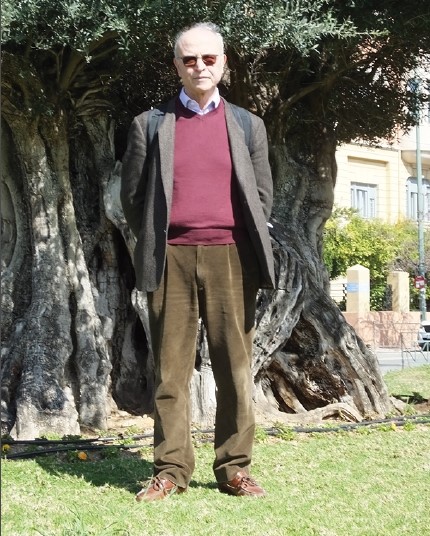
C.V: It may look irrelevant to this question at first, but I have to say that my university student years coincided with the time where in Greece we had a military dictatorship, which most of us despised a lot. This led to several clashes and student unrest. When finally, the military regime collapsed a new round of student political activism broke out. All this had the result that most of our student years were covered in a bit of haze due to the political climate. Thus, when finishing my Engineering Diploma Degree, I had a rather vague idea of what I had learnt in university and what to do next. Continuing to graduate studies abroad was a kind of way out for me both to have the opportunity to study a little deeper, but also to take some distance from the over-politicized scene at home. Canada being far away was a natural choice. I should say also that US was not popular in Greece at that time due to their support to the military regime, for which President Clinton was brave enough to apologize many years later.
PAC World: Why did you select University of Saskatchewan?
C.V.: As I already admitted my ideas about studying were a bit vague at the time. One of the subjects I liked in university was automatic control. I was also influenced by the then rising modern subject called “cybernetics,” so in the motivation statement sent with my application for graduate studies I was maybe a bit over-enthusiastic on the subject. This it seems did not fit well with my electrical energy background for most Universities with the exception of Saskatchewan, where there was a great power engineering group with Roy Bilinton, Mo Shaschdev, Ahmed El-Sarafi, Kim Bolinger and of course my future supervisor, Ron Fleming, who was the one working on Power System Control. Thus, it was actually University of Saskatchewan and Professor Ron Fleming that chose me and eventually made me a Power Systems Control engineer.
PAC World: Did you have any interests other than learning while at university?
C.V.: As I said above in Greece it was a highly political climate when I was a student. We were watching movies by Godard, Fellini, Antonioni, but also several others. We were also reading a lot, international literature, as well as political pamphlets. May 1968 in Paris, and also American human rights movement and student uprisings, such as in Berkeley were very much in our extra-university agenda. With this came protest songs, Bob Dylan and Joan Baez, but also Rock ‘n Roll, Beatles and Rolling Stones, the whole set, together of course with Greek music and endless tavernas with heated discussions followed by collective singing, not always in tune, to be frank. Traveling within Greece and discovering for the first-time wonderful beaches and mountain tracks was also a favorite pastime after the end of exams.
PAC World: What made you go back to Greece after you graduated?
C.V.: This is another story… After finishing an MSc degree in Saskatchewan Prof. Fleming proposed to me a very challenging PhD topic: continuous space modeling of generator electromechanical oscillations with partial differential equations. At the same time in NTUA a new professor, Basil Papadias was starting to form a power engineering group, offering a salaried PhD position, as for the first time in Greece it became possible to have Teaching/Research assistants doing their PhD in parallel. This was an opportunity I could not resist, to paraphrase the famous line from Copola’s Godfather. The question is, did I regret not doing the electromechanical wave modeling? Others followed that path, and some good results did come out, but for me a real breakthrough is still possible to come through in this area of space continuity. Especially if applied to distribution networks that are much more compact in space and far less crisp in terms of detailed data and measurements than transmission systems. Unfortunately, it is too late in my career to start again on this topic, but I do hope some will follow it with success.
PAC World: Is there any specific reason to choose an academic career?
C.V.: The position I had as Research Associate eventually led, after finishing my PhD degree and served my two-year obligatory military duty, to the opportunity to become a tenure track faculty member. In the meantime, I was already quite deep in research at the time on the subject of stabilizing electromechanical oscillations, but also on modeling various forms of power generation and investigating the effect of speed governors and voltage controllers on oscillation damping. I was also heavily involved in restructuring the power engineering curriculum in NTUA by helping introduce new courses and computerized labs for power students. So, following an academic career came as a natural choice for me.
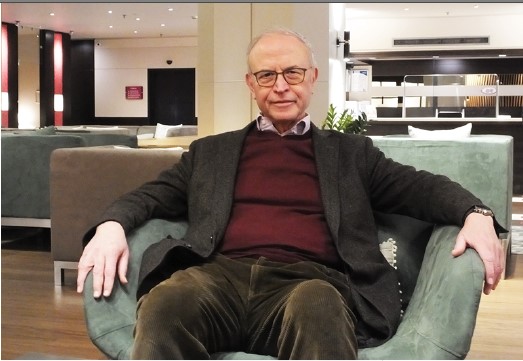
PAC World: You spent more than thirty-five years teaching at the National Technical University of Athens (NTUA). Do you see any difference in the students in 1988 and today?
C.V.: Thanks for this question. It is indeed one opportunity to see how things are evolving with time. The trend had many ups and downs. Traditionally students in NTUA were highly motivated and eager to learn. This however subsided with time as concerns over lack of well-paid job opportunities were becoming dominant, even if not necessarily valid. I was happy to see that this valley was eventually left behind and now we have again a very eager student population. In particular, renewable energy and the rising concern on climate change, but also an abundance of energy job opportunities, has boosted student motivation towards power engineering. Of course, the degree of student familiarity with computer and communications technology has made an unimaginable progress since the 1980s.
PAC World: You have been involved in teaching and research on a wide range of topics related to power system dynamics, stability, and control. How do you explain your interest in that and do you have a favorite?
C.V: As I said before, both in my MSc at Saskatchewan and my PhD I concentrated on what we now call small-signal stability (the term at the time was “dynamic: stability but was eventually dropped as all types of stability are dynamic). When later I was testing a phasor simulation program, I had developed I was amazed to see that if I used constant power loads the simulation suddenly stopped and could not continue after some point in time. I thought initially that it was a software bug, but then I realized by plotting the intermediate results that voltages were actually collapsing and at the point the simulation diverged the slope was literally vertical and there was no way the phasor simulation could go any further. I also realized by turning a transparency with the collapsing voltage response upside down, that a singularity could mark the end, but also the beginning of time (a Big Bang), if one reversed the integration direction going to negative time. By the way this finding impressed Prof. Pete Sauer when he was visiting Athens for the first Power Tech of 1993 and I guess contributed to the invitation, he and Prof. Pai extended to me to visit Illinois the next year…
Anyway, this collapsing simulation brought me to the area of Voltage Stability that was already doing big steps and to which I contributed for the first time during the third Les Fink’s Voltage Stability Seminar in Davos in 1994. At the same time frame, I met my close friend and colleague Thierry Van Cutsem, whom I visited in the University of Liege before I went to Illinois and with whom after several productive and heated discussions, we managed to coauthor the book on Voltage Stability of Power Systems that constitutes a reference point to this day. The book was published by Kluwer in 1998, made a second edition in 2008 by Springer and is still selling.
Of course, in recent years as many others my research interests include the integration of renewable energy sources in the power grid and the effect the large amount of converter connected resources has on power system dynamics and stability.
PAC World: What do you think about the importance of coordination between substation level voltage control and DER inverter voltage control?
C.V.: This is related to one of my favorite topics at this time. The new paradigm for operating securely a power system involves control and stability related services to be acquired from distribution feeders. This requires a redesign of substation automation, but also of converter control design to be able to receive appropriate inputs and commands.
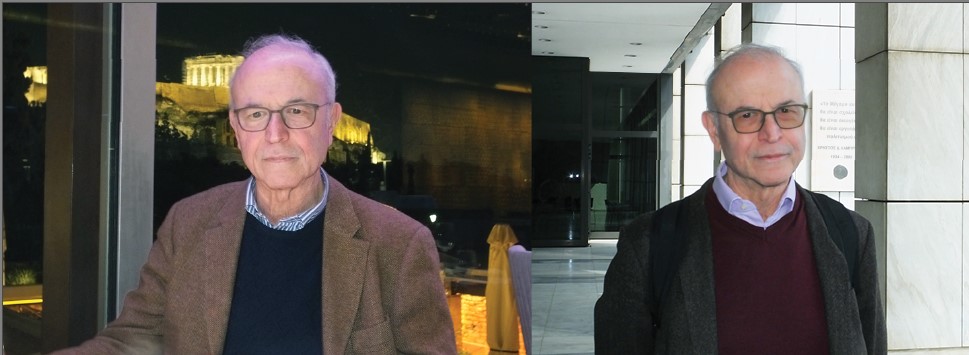
PAC World: Do you think it is possible to avoid blackouts?
C.V.: It is well established in various occasions that answering this question in the affirmative brings bad luck. When someone is asserting that their system is immune to blackouts, one is usually round the corner. What we can do with blackouts is to reduce their probability and mitigate their effects. This is all about this new area of Resilience. In my own research what I advocate is to combine on-line Security Assessment at the Control Center (that is investigating what-if scenarios based on the current operating point) with real-time, measurement-based stability monitoring. And of course, to have prepared beforehand preventing and corrective emergency countermeasures against lack of security or imminent instability.
PAC World: You have been involved as organizer or participant in many conferences around the world. What do you think is the role of these conferences in our industry and why is it important for practicing engineers to participate in conferences?
C.V: I believe conferences is all about exchanging views and understanding each other’s work in depth. Reading (and writing) papers is what we do most of the time but having the opportunity to really exchange with other authors, ask questions, argue merits and weaknesses of different approaches is an indispensable and irreplaceable part of research, if we want to move forward and not in circles or parallel lines. The pandemic brough about the “virtual” conference, which is better than nothing, but definitely not the way to go when we have the person-to-person opportunity. Without the people I have met and the discussions I have had in Conferences, I do not think I could have achieved not even one half of what I have achieved so far.
PAC World: You have been actively involved in both IEEE and CIGRE. How do you see their role in our industry?
C.V.: Both organizations provide valuable service to our community. CIGRE through the National Committees and Scientific Committees helps to create a forum where technical challenges can be addressed collectively at different levels. IEEE has a tremendous impact through publishing Transactions and organizing Conferences worldwide and also through the network of Sections/Regions and Chapters/Societies. I believe volunteer participation is also advantageous for those offering it, because you learn a lot through the interaction with other colleagues.
PAC World: What do you think about the importance of participation in working groups?
C.V: Again, this participation is a two-way avenue. Members contribute with their individual input based upon their own research activities (thus making them widely known), but also, earn a lot through their interaction with others. Finally, the resulting brochure or technical report is an asset for the whole community. Of course, as in all consensus-based activities a lot depends on the ability of the Convenor/Chair to synthesize different points of view in a productive way. Colleagues with very well-formed and clear-cut ideas may find it easier to write their own books or monographs, instead of trying to convince others in a Working Group
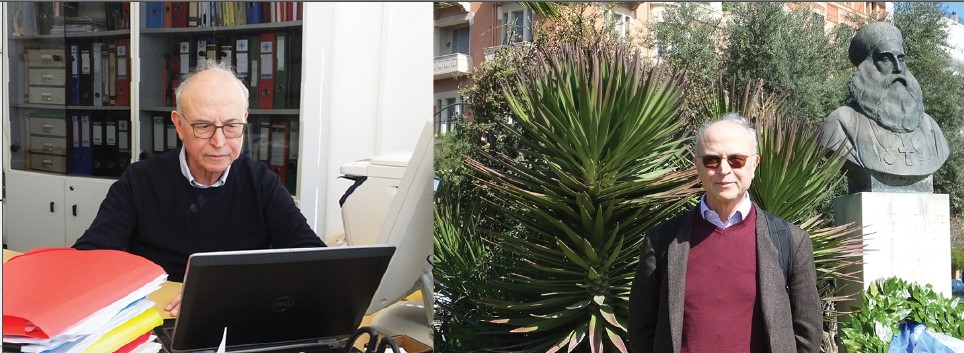
PAC World: What do you think is the impact of IEC 61850 on the future of protection and control?
C.V.: I will pass on this one, because I have no particular involvement with IEC 61850.
PAC World: What is the greatest challenge you faced during your professional career?
C.V.: This is a tough question and requires some pondering. Going into a class of one hundred or more students to teach them (let alone correcting their papers) is enough of a challenge, I guess. But if I have to concentrate on one great challenge, I would choose the post-mortem I performed for the blackout of July 2004 in Athens and South Greece a few days after it happened, and just one month before the Athens Olympic Games. It came out it was a case of long-term voltage instability and collapse, which was able to be reproduced with sufficient accuracy so that it could be guaranteed that after some immediate upgrades performed, the power system could withstand the same sequence of events without coming even close to a blackout. Of course, I avoided to declare that another blackout was impossible, so luckily none happened.
PAC World: What do you consider your greatest professional achievement?
C.V.: I believe the method I have developed with my students for real-time, measurement-based, voltage instability detection, for which we hold a Greek patent and is currently being installed in the control center of IPTO, the Independent Power transmission Operator of Greece, is my biggest achievement. It is based on the LiVES method (Local Identification of Voltage Emergency Situations) which is a method of detecting instability by measuring the LTC controlled voltage of bulk power delivery transformers and we had developed with my friend and co-author Thierry Van Cutsem from LIiege. The new indicator we have named NLI (New LIVES Index) when applied to transmission bus PMUs and can also be installed on transmission line digital relays, in which case we call it RLI (Relay-based LIVES Index). Sorry I got a bit technical on this.
PAC World: You have received many awards. Which one do you consider the most important to you?
C.V I consider the Prabha Kundur Award I received in 2019 from IEEE Power and Energy Society the most important one for me. The inscription reads “for leadership in the analysis of voltage collapse and understanding power dynamic phenomena.” The latter part on “understanding” probably refers to my work with Professors M. A. Pai and Pete Sauer when in Illinois.
PAC World: Do you believe that we are going to see artificial intelligence applications in power system control in the future?
C.V.: So much talk about AI these days! I believe we have first to demystify the reference to thinking machines, but then realize what AI can perform that we cannot. For power system control you are asking, I believe there is indeed space for applying AI mostly to handle the very high number of available measurements in distribution grids to construct the new paradigm of distributed control of the power grid, to which I referred earlier. So, my answer is yes! I can see AI being used to control for instance home appliances to keep an acceptable comfort level for the inhabitants and still be able to offer services for control and stability of the whole grid to other intelligent devices, maybe at the substation level. But, no, I cannot see an intelligent machine doing the job of power system operators at the control center. I see the human operator handling AI applications similarly to what is done today using the anyway highly automized SCADA information concerts and watching movies.
PAC World: Do you think it is possible to prevent wide area disturbances and blackouts?
C.V.: One can certainly devise methods for containing them….
PAC World: How do you see the future of our industry?
C.V.: Things are changing fast with both digitalization and renewable and converter-controlled resources. This will lead to a new paradigm of operation and control using distributed optimization and also utilizing consumer participation. In this respect several areas have come already close together. A few years back it seemed that protection and relaying was separate to dynamic performance. Now we cannot run dynamic performance simulations without taking into account relay response. And similarly, one cannot test relay performance only locally without anticipating its effect to system dynamic performance. Just a small example, because the same can be said about power electronics and power systems etc., etc.
PAC World: You are still actively involved in IEEE and CIGRE, conferences, teaching and innovation. What keeps you going?
C.V.: I guess my inability to stop… I cannot find another reason. Luckily my status as Emeritus allows me to teach one class per semester (Power Generation and Power System Stability) and having access to research projects, so little has changed after my retirement. In parallel we have established with two of my former students a private company called Power Systems ARTS to exploit our patent on the voltage instability indicator I mentioned before. As you see I am still in search of a means to slow down, assuming of course that I do keep healthy.
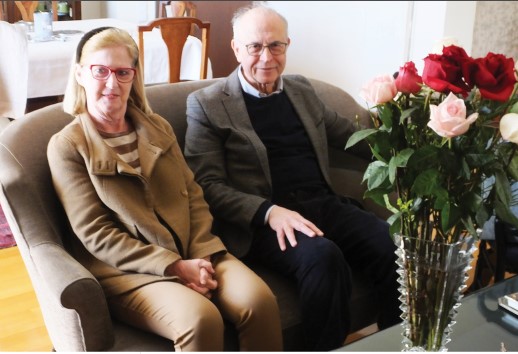
PAC World: How do you balance your active professional life with your family life?
C.V.: This you have to ask my wife, Malvina… On my part I do my best, but I do not think that this is enough. Maybe she has to apply the break I mentioned before…
PAC World: What do you consider your greatest personal achievement?
C.V.: Keeping close ties with friends here in Athens, where we meet regularly, but also in other places, some far away, some professional, some not. The pandemic challenged this a lot, but we managed to overcome it so far successfully.
PAC World: What do you like to do when you are not working?
C.V.: I still read a lot, mostly crime novels at this point in time, but my favorite 20th century writers are James Joyce and Marcel Proust to whom I go back now and then. I also love poetry especially that of C. P. Cavafy. I also watch sports mainly basketball, but European football at high level is also thrilling for me. Traveling in Greece is also a wonderful pass time, even though I cannot say that I am “strictly” not working when in holidays.
Another thing that is not so much work as fun is editing an electronic magazine with a few friends for the Greek CIGRE National Committee called “Pylons.” We have already published three issues and we have the plan to bring it to a six-month periodicity.
PAC World: You travel a lot all over the world. Do you have a favorite place?
C.V Difficult question… There is an old Greek song “London, Paris, New York, Budapest and Vienna, none of you to Athens
can compare.” I have a lot of favorite spots in all of these, as well as in Chicago, Canada, several Italian and other European cities and there are so many other places we have not been yet.
PAC World: Do you have favorite music?
C.V I prefer jazz, but I also like classical music and a lot of what is called world music. My favorite song is the Girl from Ipanema. With some friends we still sing from time-to-time older Greek songs, and we go to several concerts when we find the opportunity. There is a new Opera House in Athens that we visit a few times per year and also a beautiful Roman theater at the foot of the Acropolis with several excellent events during Summer.
PAC World: Your favorite form of entertainment?
C.V Reading when on my own and going out with friends mostly to restaurants and a few remaining tavernas. I spoke about travel already…
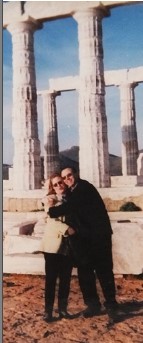
PAC World: What is your favorite food
C.V I have a musician friend living in London with whom we share a passion for cooking pasta in Italian style. But I can cope with Greek food, as well as several other cuisines…
PAC World: Do you have a motto?
C.V In our Voltage Stability book with Thierry, we have introduced one on each chapter. Maybe my favorite one is that attributed to Einstein: “make it as simple as possible, but not simpler.” Close by is the answer of Euclid to King Ptolemy: “there is no royal road to geometry.”
Biography:
Constantine (Costas) Vournas is Professor Emeritus in the School of Electrical and Computer Engineering of National Technical University of Athens, Greece. He has published close to 200 papers in International Journals and Conferences and has co-authored the book “Voltage Stability of Electric Power Systems.”
His research interests are in the area of power system dynamics, stability and control and include voltage stability monitoring and security analysis, wind generator integration in power systems, and novel control applications for distribution and transmission. Fellow of IEEE (2005) and member of CIGRE. He received the IEEE/PES Prabha Kundur Award in 2019. He is Chair of PES Greece Chapter, Past Chair of IEEE/PES Power Tech Steering Committee (2007-2019), was Region 8 Representative on the IEEE Power and Energy Society (PES) Governing Board (2011-2014) and Chair of the IEEE/PES Power Systems Dynamic Performance Committee. Since 2021 he is Chairing the Energy WG of the IEEE European Public Policy Committee (EPPC) and is member of EPPC.



